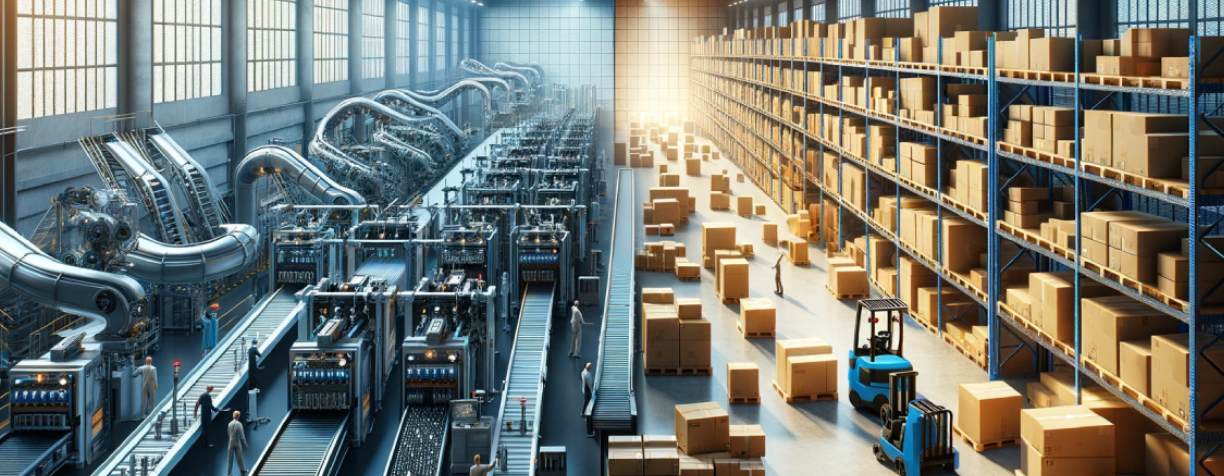In the realms of commercial real estate and business operations, the terms warehouse space and industrial space are often used interchangeably. However, there are distinct differences between the two, each serving unique purposes and catering to different business needs.
This article will delve into the nuances that differentiate warehouse space from industrial space, exploring their respective characteristics, uses, and considerations for businesses seeking the right type of space.
Table of Contents
Understanding Warehouse Space
Warehouse spaces are large, open structures primarily used for storing goods and inventory. These facilities are integral to the supply chain, providing a central location for companies to store products before distribution.
The primary function of a warehouse is to ensure that goods are stored safely and efficiently until they are ready to be transported to retailers, wholesalers, or directly to consumers.
Characteristics of Warehouse Space
Storage Capacity: Warehouses are designed with high ceilings and large floor areas to maximize storage capacity. They often incorporate shelving and racking systems to organize and store products effectively.
Loading Docks: Most warehouses are equipped with multiple loading docks to facilitate the easy loading and unloading of goods. These docks are essential for accommodating large trucks and shipping containers.
Climate Control: Depending on the type of goods stored, warehouses may have climate control features, such as refrigeration or humidity control, to preserve product quality.
Location: Warehouses are typically located near major transportation hubs, like highways, ports, or railroads, to streamline the logistics process.
Read more: Critical Role of Temperature-Controlled Warehousing for Sensitive Products
Understanding Industrial Space
Industrial spaces, on the other hand, encompass a broader range of uses, including manufacturing, production, heavy or light assembly, and sometimes even research and development. These spaces are designed to accommodate both the workforce and the machinery required for the industrial processes.
Characteristics of Industrial Space
Manufacturing Facilities: Industrial spaces often include areas for manufacturing and production, equipped with heavy machinery and power resources.
Workforce Accommodation: These spaces may have office areas, restrooms, and break rooms to support a workforce.
Utility Access: Industrial spaces require access to various utilities, such as high-capacity electrical power, water, and sometimes specialized ventilation systems.
Zoning and Compliance: Industrial spaces must adhere to specific zoning laws and regulatory compliances, especially if the manufacturing processes involve hazardous materials or produce significant emissions.
Key Differences Between Warehouse and Industrial Space
Purpose and Use: The most fundamental difference lies in their primary use. Warehouses are mainly for storage, while industrial spaces are for manufacturing and production activities.
Design and Layout: Warehouses prioritize storage space and ease of access for goods, whereas industrial spaces are tailored to accommodate machinery, production lines, and a workforce.
Utility Needs: Industrial spaces often have higher utility needs, including power and water, compared to warehouses, which may require minimal utilities beyond basic lighting and climate control.
Location Considerations: While both types of spaces are usually located outside of residential areas, industrial spaces may have more stringent location requirements due to zoning laws, especially if they engage in activities that produce noise or emissions.
Floor Specifications: Industrial spaces often have reinforced floors to support heavy machinery, whereas warehouses prioritize smooth, durable surfaces for easy movement of goods.
Lease Costs and Terms: The cost of leasing industrial space can vary significantly from that of warehouse space, often influenced by the specialized infrastructure and utility needs of industrial operations.
Read more: Inventory Visibility and Control with Comprehensive Warehousing
Choosing the Right Space for Your Business
When deciding between a warehouse and an industrial space, businesses must consider their operational needs:
Nature of Business: A company focused on manufacturing or production will require industrial space, while a business that needs to store and distribute products may be better suited to warehouse space.
Growth and Scalability: Consider future growth needs. A business expanding its manufacturing capacity might require more industrial space, whereas increasing inventory might necessitate additional warehouse space.
Location and Logistics: The location should align with the business’s logistics strategy. Proximity to suppliers, customers, and transportation networks is crucial.
Budget and Costs: Evaluate the cost implications, including lease or purchase costs, utility expenses, and any modifications required to make the space fit for purpose.
Conclusion
Understanding the differences between warehouse and industrial space is crucial for businesses to make informed decisions about their real estate investments. While warehouses are tailored towards storage and distribution, industrial spaces cater to manufacturing and production needs. Each type of optimize space offers different features and must be selected based on the specific requirements of the business. By carefully considering their operational needs, businesses can choose the right type of space to support their growth and operational efficiency.
Read more: Warehousing Services: From Receiving to Distribution
FAQ:
1. Why is location important when choosing between warehouse space and industrial space?
Location is crucial for logistical efficiency and adherence to zoning laws, especially for industrial spaces that might produce emissions or noise.
2. Are there differences in utility needs between warehouse and industrial spaces?
Yes, industrial spaces often require more utilities, including high-capacity electrical power and specialized ventilation, compared to warehouses.





